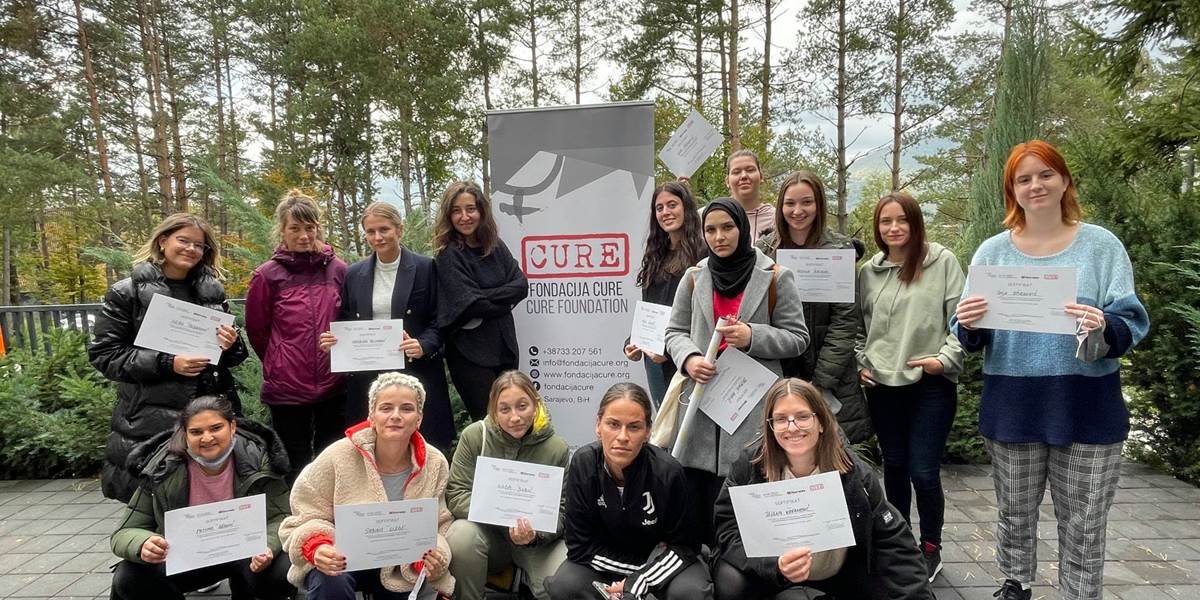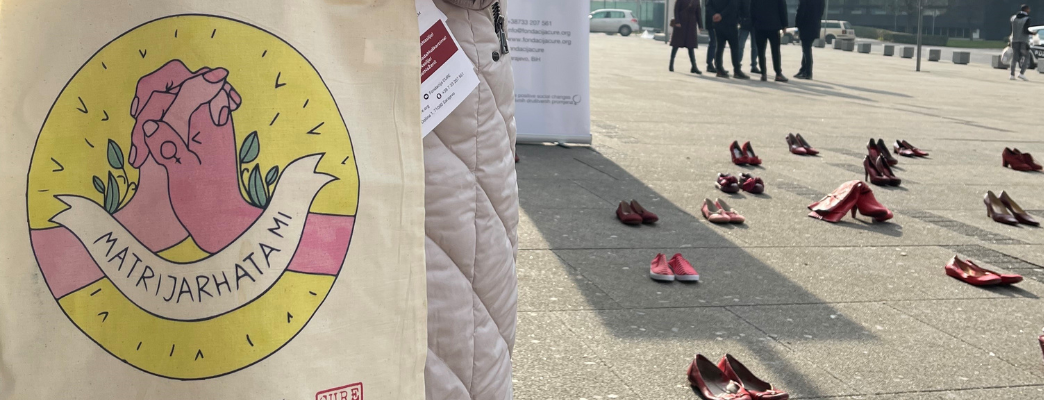Gender-based violence in youth relationships is a topic that is often not given enough attention, which makes trainings of young people to help them face this problem extremely important. However, there is a lack of knowledge and qualified trainers on this subject. To alleviate this problem, the Training of Trainers (ToT) model can be useful. ToT is intended to engage experienced trainers in coaching new trainers on a particular topic or skill. A ToT workshop can build a pool of competent instructors who can then teach the material to others.
We talked to CURE Foundation activist Medina Mujić, who organized this event.
How would you describe the situation when it comes to home abuse and sexual violence against women in Bosnia and in the region in general?
Domestic violence and sexual violence against women in Bosnia and Herzegovina are constantly on the rise. According to the OSCE Survey on the Welfare and Safety of Women in B&H from 2019, out of 2,321 respondents, 48% of women over the age of 15 experienced some form of gender-based violence, and in most cases the perpetrator was an intimate partner or family member.
Since the outburst of the coronavirus pandemic, violence has been increasing even more, because many women and girls are forced to stay at home with their abusers. According to the Local Democracy Foundation, 34% of those who experienced violence said that the intensity of violence had increased since the onset of the pandemic, while 70.6% of them have not even reported it. In addition, according to data obtained by the B&H Agency for Gender Equality, which collected data from judicial institutions and non-governmental organizations, 12 women were killed in B&H last year, a total of 56 since 2015, but these homicides are not treated as femicide. We believe that the situation in the region is very similar.
Tell us how your project “Speak up against violence” contributed to the work of your organization, and to the issue of combating sexual and gender-based violence?
The CURE Foundation advocates for the equality of women and girls in B&H, especially those from socially marginalized groups, for a society without patriarchal norms, in which violence and discrimination are not tolerated, and where women are recognized as responsible initiators and bearers of positive social change. We have paid special attention to the phenomenon of violence in youth relationships, to educating young people on prevention, recognition and response to violence, and to teaching them ways to build nonviolent relationships. The project "Speak up against violence" arose from the need to work with young people in order to eliminate all forms of violence, and the fact that, currently, education on the topic of violence in B&H is scarce. Institutions are focused on preventing the spread of the coronavirus pandemic, while violence deepens and intensifies. This project is very important for CURE Foundation, and we hope to continue with our efforts to prevent all forms of violence and sexual harassment, with the support of our donors, by working with high schools, colleges, and other educational institutions, and by sharing knowledge with other organizations throughout B&H.
Your project is regional, who is you partner and how is your cooperation with them reflected in the project?
Our partner in this project is the Autonomous Women's Center from Belgrade, Serbia, with which we have excellent cooperation. Even though we work in different countries and in different contexts - the problems we tackle are the same. As both associations work on eliminating all forms of violence, we decided to initiate a project that will provide for knowledge exchange, and for creating an original and effective educational program, which will attract the attention of young people, with a special focus on young women. Initially, AWC launched the project "I can say no" and then, thanks to the support of our donors, we jointly brought and expanded this idea in B&H. CURE Foundation created a program to share knowledge and experience with 5 organizations from 5 B&H local communities, under the mentorship of AWC. We focused on training peer educators to run their own educational programs. Due to the coronavirus pandemic, we initially decided that the workshops should be organized online. However, sharing their experience from the project "I can say no", AWC pointed out that workshops implemented live are extremely valuable, as young people highly appreciate live discussions. We hope that we will soon be able to organize such workshops in schools, universities, and other institutions.
You have recently held a live training for trainers. Could you share some impressions from this training?
Peer educators who participated in the training have already been engaged in lot of activist work, but where motivated to participate due to this specific topic. They emphasized that the topic of violence is not taught in formal education, and that they also do not have the opportunity to be educated in the NGO sector how to deal with issues of gender-based violence and violence in youth relationships.
Their enthusiasm and desire for positive change in society gives me, as the coordinator of this project, additional motivation, and faith that young people really want to make positive changes in society. We have completed almost half of the project activities and, so far, received a lot of positive feedback. Peer educators engaged in other activities and projects are also interested in our project, and talk about it, so we are very often contacted by the media, other NGOs, and individuals who would also like to take part in this project, or to be further informed about it. All this reinforces us in our belief that we are participating in activities that positively affect young people throughout B&H.
You pay special attention to social media, Instagram in particular, and you have also designed a series of Viber stickers. How do you perceive the importance of social media in combating sexual and gender-based violence?
Deliberating how to increase the visibility of the project and provide interesting, innovative, and quality educational content for young people, we realized that the answer is social media, especially Instagram. We created the campaign #Progovorionasilju, to articulate our project ideas in understandable language. The messages visually and textually reveal the myths related to violence that are rooted in our society, such as that jealousy is proof of love, and speak about real situations in which young women experience violence on a daily basis. Our campaign also offers a safe space where women can talk about various forms of violence, which should not be a taboo topic, and where they can realize that their immediate environment should not stigmatize them, but encourage and support them. The campaign has, so far, been very successful and has drawn attention of young people to gender-based violence and violence in youth relationships. Viber stickers designed within the campaign have also been a great success. Overall, “Speak up against violence” project has become popular and recognizable among young people.

After the training for trainers, some of the participants shared their impressions.
“This was a unique opportunity, because the system does not recognize these topics as important, especially for marginalized groups of young people. As a young Roma woman, I was motivated to gain new knowledge, to be able to share it with the youth in my community. My goal is a society without violence."- Fatima Džanić, Bijeljina
"I am overjoyed to have the opportunity attend this workshop, and I am grateful to the organizers, in particular the project coordinator Medina, as well as to our trainers Sanja and Jovana from AWC. Their way of working delighted me, because in such a short time they removed my fears and dilemmas.” - Neira Pozderović, Tuzla
“The entire program and concept of the workshops strengthened me so much. The training was intense but very interesting, I watched and listened to everything with pleasure, fearing that I would miss something. I hope that we will have the opportunity to continue working on these topics, which are of immense importance for young people in B&H.”- Ana Vidović, Banja Luka
“I enjoyed this energy, the safe space we created so quickly, and I am amazed at how much the girls relaxed and were able to share their experiences, personal stories, and situations they were in. I am so proud of myself for leaving this training empowered, no longer afraid of speaking publicly. I am looking forward to organizing an online workshop for young people on prevention and recognition of violence, as I am witnessing many violent relationships among youth. ”- Jasmina Horić, Zenica
